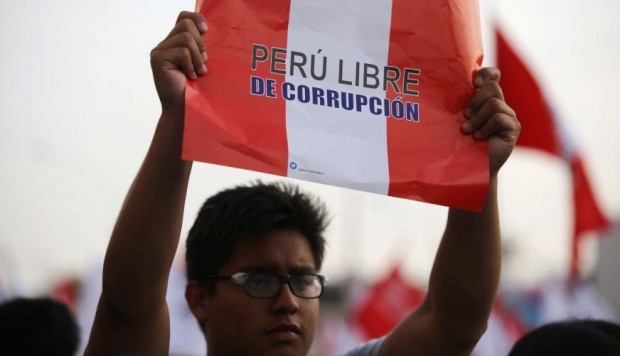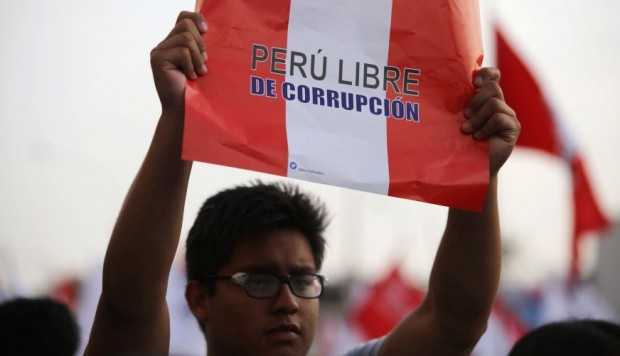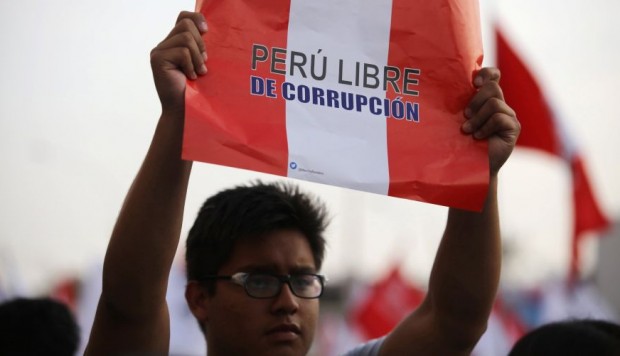Speeches Shim

Effective government institutions that represent the interests of all citizens are essential for economic growth and prosperity. However, today corruption creates a threat to the socio-economic gains the country has achieved to date and to Peru’s stability in the region. Responding to the persistent growth of illicit activity and increasing citizen discontent, USAID works with government authorities, civil society institutions, private sector and individuals to strengthen the integrity of key government processes to reduce corruption.
Despite Peru’s sustained economic growth over the past decade, rural poverty remains remarkably high at 48%. Moreover, corruption has spread to an alarming degree to Peru’s interior. The Comptroller General’s 2017 Report states that corruption generates a loss of more than $3 billion dollars annually. More than 37,000 public officials have been identified as being involved in potential cases of corruption, affecting service delivery for the poorest and most vulnerable populations.
USAID promotes greater government accountability and integrity through improved oversight and corruption prevention. Our activities build on previous efforts to help establish decentralized governance and management structures, introduce and support Peru’s Open Government efforts and prior anti-corruption efforts in the judicial arena. We work to improve government capacity to prevent, identify and control corruption in priority public investments, strengthen transparency measures in extractive industries and increase citizen engagement to promote greater accountability.
Our Work
PROMOTING INTEGRITY IN PUBLIC INVESTMENTS
Corruption pervades all levels of government in Peru. USAID has supported the Government of Peru with resource planning, execution, and public management. Public investment remains hampered by processes that are inefficient, complex and prone to corruption. To address this problem, USAID will support the GOP’s National Integrity Plan and Fight Against Corruption 2018-2021 and Peru’s Open Government commitments to reduce corruption in the Peruvian public investment process. Through integrity networks, efforts will strengthen appropriate control and supervision mechanisms, enhance civic oversight of public investment processes and build partnerships with private sector firms.
COMBATTING HUMAN TRAFFICKING
Peru is a source, transit, and destination country for men, women, and children subjected to forced labor and sex trafficking, with more than 7,400 TIP victims been reported between 2009 - 2017. Indigenous Peruvian women and girls are particularly targeted. Since 2014, USAID works with the GOP to increase the understanding of human trafficking routes, identify improvements to victim and survivor protection services, train justice operators who work with TIP victims, and increase resources to counter Trafficking in Persons (TIP) in the areas of Loreto, Madre de Dios, Cusco, and Lima. USAID has provided legal and psychological support to almost 200 TIP victims rescued through the Center of Legal and Psychological Services operated by the local NGO Capital Humano y Social Alternativo and convened conferences across these regions to raise public awareness of TIP. USAID’s partnership with the GOP has helped increase public attention and more than doubled public funding to stop trafficking and help victims.
PROMOTING TRANSPARENCY IN THE EXTRACTIVE SECTOR
While the Peruvian Amazon is rich in timber and natural resources, tax revenues from their extraction are often misused. To address this problem, USAID builds the GOP’s ability to remain complaint with the Extractive Industries Transparency Initiative (EITI), an internationally-recognized process to form agreements with governments, businesses, and civil society organizations to promote transparency and accountability in determining how to use royalty resources for local development, for example, the regional Governments of Piura, Moquegua, and Loreto approved EITI agreements and established citizen committees to monitor progress. USAID trained over 1,000 community leaders in participatory budgeting, resulting in greater engagement in annual budgeting processes and new channels to monitor government expenditures for the benefit of the public.
ENGAGING CITIZENS IN RECONSTRUCTION TRANSPARENCY
USAID promotes transparent and effective reconstruction in the wake of the disastrous “Niño Costero” floods of 2017. The Government of Peru’s $9 billion reconstruction efforts will rebuild homes, schools and clinics, clean rivers, repair roads and sanitation systems. USAID’s efforts with the Integrity Observatory, comprised of local NGOs and universities, the Authority for Reconstruction, the Comptroller General’s Office, the Organismo Supervisor de las Contrataciones del Estado (OSCE) and the Public Integrity Secretariat promotes effective oversight and greater government accountability of the reconstruction process. Since April 2018, 75 veedurias ciudadanas have formed which have overseen almost 80 public works in five regions targeted for reconstruction, valued at over $100 million.
STRENGTHENING ELECTIONS AND POLITICAL PROCESSES
Conducting free, fair and clean elections are a fundamental democratic principle. Since 2014, USAID promotes citizen initiatives to increase voter awareness and combat illegal campaign financing. USAID also supports the Peruvian entities to discuss and approve electoral and political reforms. Initiatives now enable citizens to access information about candidates’ legal background and finances. These activities were implemented in the context of the Peruvian general elections in 2016 and sub national elections in 2018.
PRIORITIZING INDIGENOUS COMMUNITIES AND WOMEN
Across all areas of partnership, USAID promotes multiculturalism and gender equality. In Madre de Dios, USAID supports indigenous communities, farmers, and miners with the development of community ‘life plans’. These instruments bring together different groups to identify and implement a common economic development vision. Eleven life plans have been developed to date in remote rural areas. To further support community cohesion, USAID has trained over 1,000 citizens in conflict mitigation and resolution skills.
Governance - English ![]() (pdf - 106k)
(pdf - 106k)
Governance - Spanish ![]() (pdf - 164k)
(pdf - 164k)




Comment
Make a general inquiry or suggest an improvement.